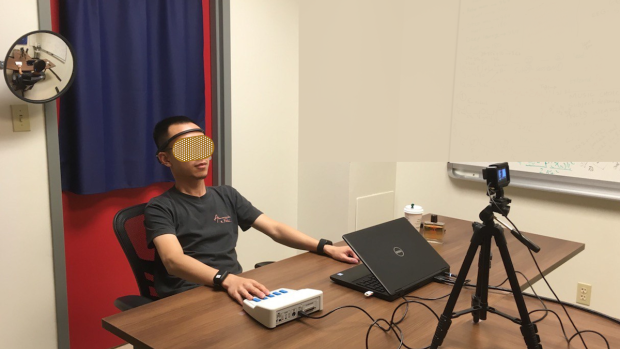People’s everyday pleasures may improve cognitive arousal and performance
According to new research involving MINDWATCH, a groundbreaking brain-monitoring technology developed by Rose Faghih

Subject undergoing MINDWATCH testing. Photo Credit: Hamid Azgomi
UPDATE March 4, 2024: The data set that Faghih’s lab collected for this research is now available to the global research community on the PhysioNet platform. This dataset is unique, offering real-world insights into how common pleasures affect our physiological responses and cognitive performance.
The potential of this dataset is vast. It opens new avenues for research into the influence of everyday experiences on cognitive performance, potentially leading to smarter work environments or personalized life-enhancing strategies. Imagine tailoring your work environment with specific sounds or scents to boost productivity and creativity. By analyzing this dataset, researchers can discover patterns and connections previously unseen. This could lead to breakthroughs in understanding how to harness everyday experiences to enhance cognitive abilities. Ultimately, this research could pave the way for innovative applications in workplace productivity enhancement and educational method improvement.
“This dataset is more than a collection of data points; it is a window into the intricate relationship between daily pleasures and our brain's performance,” says Fekri Azgomi, Faghih’s former PhD student who collected this data. “As our lab, the Computational Medicine Laboratory, shares this dataset with the world, we are excited about the endless possibilities it holds for advancing our understanding of the human mind and enhancing everyday life.”
Original story below.
Listening to music and drinking coffee are the sorts of everyday pleasures that can impact a person’s brain activity in ways that improve cognitive performance, including in tasks requiring concentration and memory.
That’s a finding of a new NYU Tandon School of Engineering study involving MINDWATCH, a groundbreaking brain-monitoring technology.
Developed over the past six years by NYU Tandon's Biomedical Engineering Associate Professor Rose Faghih, MINDWATCH is an algorithm that analyzes a person's brain activity from data collected via any wearable device that can monitor electrodermal activity (EDA). This activity reflects changes in electrical conductance triggered by emotional stress, linked to sweat responses.
In this recent MINDWATCH study, published in Nature Scientific Reports, subjects wearing skin-monitoring wristbands and brain monitoring headbands completed cognitive tests while listening to music, drinking coffee and sniffing perfumes reflecting their individual preferences. They also completed those tests without any of those stimulants.
The MINDWATCH algorithm revealed that music and coffee measurably altered subjects’ brain arousal, essentially putting them in a physiological “state of mind” that could modulate their performance in the working memory tasks they were performing.
Specifically, MINDWATCH determined the stimulants triggered increased “beta band” brain wave activity, a state associated with peak cognitive performance. Perfume had a modest positive effect as well, suggesting the need for further study.
“The pandemic has impacted the mental well-being of many people across the globe and now more than ever, there is a need to seamlessly monitor the negative impact of everyday stressors on one's cognitive function,” said Faghih. “Right now MINDWATCH is still under development, but our eventual goal is that it will contribute to technology that could allow any person to monitor his or her own brain cognitive arousal in real time, detecting moments of acute stress or cognitive disengagement, for example. At those times, MINDWATCH could ‘nudge’ a person towards simple and safe interventions — perhaps listening to music — so they could get themselves into a brain state in which they feel better and perform job or school tasks more successfully.”
The specific cognitive test used in this study — a working memory task, called the n-back test — involves presenting a sequence of stimuli (in this case, images or sounds) one by one and asking the subject to indicate whether the current stimulus matches the one presented "n" items back in the sequence. This study employed a 1-back test — the participant responded "yes" when the current stimulus is the same as the one presented one item back — and a more challenging 3-back test, asking the same for three items back.
Researchers tested three types of music - energetic and relaxing music familiar to the subject, as well as novel AI-generated music that reflected the subject’s tastes. Consistent with prior MINDWATCH research, familiar energetic music delivered bigger performance gains — as measured by reaction times and correct answers — than relaxing music. While AI-generated music produced the biggest gains among all three, further research is needed to confirm those results.
Drinking coffee led to notable but less-pronounced performance gains than music, and perfume had the most modest gains.
Performance gains under all stimulations tended to be higher on the 3-back tests, suggesting interventions may have the most profound effect when “cognitive load” is higher.
Ongoing experimentation by the MINDWATCH team will confirm the efficacy of the technology’s ability to monitor brain activity consistently, and the general success of various interventions in modulating that brain activity. Determining a category of generally successful interventions does not mean that any individual person will find it works for them.
The research was performed as a part of Faghih’s National Science Foundation CAREER award on the Multimodal Intelligent Noninvasive brain state Decoder for Wearable AdapTive Closed-loop arcHitectures (MINDWATCH) project. The study's diverse dataset is available to researchers, allowing additional research on the use of the safe interventions in this study to modulate brain cognitive states.
Faghih served as the senior author for this paper. Its first author is Hamid Fekri Azgomi, who earned his Ph.D. under Faghih and is now a postdoctoral scholar of neurological surgery at the University of California San Francisco School of Medicine.
Fekri Azgomi, H., F. Branco, L.R., Amin, M.R. et al. Regulation of brain cognitive states through auditory, gustatory, and olfactory stimulation with wearable monitoring. Sci Rep 13, 12399 (2023). https://doi.org/10.1038/s41598-023-37829-z





